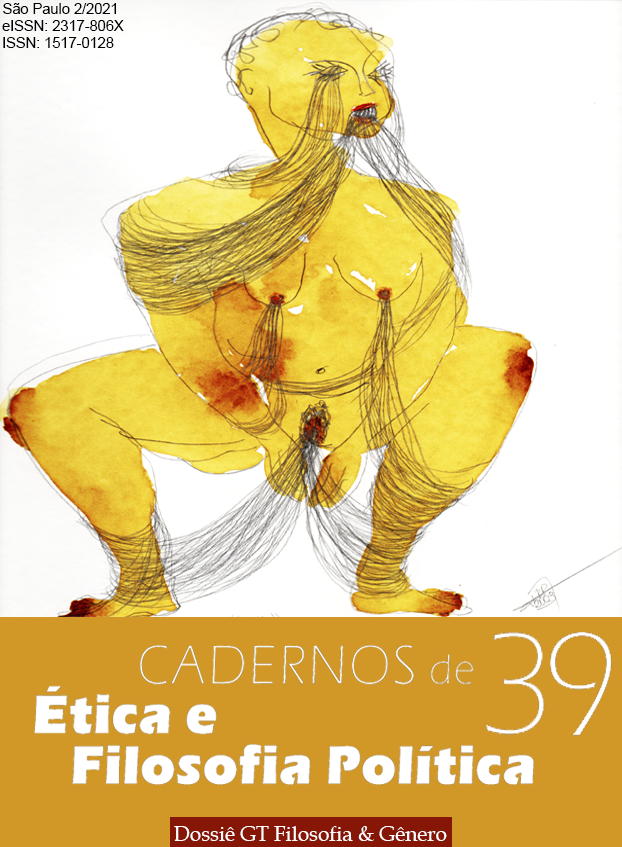The impact of corporeality on Catharine MacKinnon’s writings in the 1990s
DOI:
https://doi.org/10.11606/issn.1517-0128.v39i2p45-56Keywords:
Catharine MacKinnon, Corporeality, Feminisms, Humanity, ViolenceAbstract
Catharine MacKinnon's feminist theories of the 1990s on the issue of the body broaden discussions about the process of materializing meanings and submitting women to power. MacKinnon, especially on Are Women Human? proposes to expand the protection of women against violence, aiming to achieve genocide connotations in rape trials in times of war, due to their ethical-political impact. The pornography scene is also deeply criticized by her, as the verticality of an explicit violence that should be combated. When questioning the scope of her theory at the historical moment of its production, it appears that her concerns reach the present day in new axiological guidelines, but still as a challenge and a theoretical necessity in feminist topics today.
Downloads
References
BESUSSI, A.; FACCHI, A. Introduzione all’edizione italiana di: Le donne sono umane? Bari; Roma: Laterza, 2012.
BESUSSI, A.; FACCHI, A. “Introduzione all`edizione italiana di Le donne sono umane?” Jura Gentium: Rivista di filosofia del diritto internazionale e della politica globale. v. X1, n. 1, 2014. Disponível em: https://www.juragentium.org/topics/women/it/besussifacchi.pdf. Acesso em: 23.03.2019.
BROWN, W. “‘The Most We Can Hope For...’: Human Rights as the Politics of Fatalism”. The South Atlantic Quarterly, v. 103, n. 2-3, p. 451-463, 2004.
BURGOS DIAZ, E. “Cruzando líneas. Trazando conexiones.” Feminismo/s, v. 15, p. 33-54, 2010. Disponível em: https://rua.ua.es/dspace/bitstream/10045/15625/1/Feminismos_15_03.pdf. Acesso em 13.02.2018
BURGOS DIAZ, E. Devenires corporales: como pensar de un outro modo. Thémata: Revista de Filosofía, v. 46, p. 331-343, 2012. Disponível em: http://institucional.us.es/revistas/themata/46/art_28.pdf. Acesso em 13.02.2018
BUTLER, J. Bodies that Matter. On the Discursive Limits of Sex. New York: Routledge, [1993] 2011.
CASTILLO, A. “Lo humano, la violência y las mujeres.” Archivos de Filosofía, v. 4-5, p. 31-39, 2009/2010.
COPELON, R. “Terror íntimo: violencia doméstica entendida como tortura.” In: COOK, R. (Ed.). Derechos Humanos de la Mujer. Perspectivas nacionales e internacionales. Bogotá: Profamilia, p.124-130, 1997.
COSTA, C. L. “O sujeito no feminismo: revisitando os debates.” Cadernos Pagu, n.19, p.59-90, 2002. Disponível em: https://www.scielo.br/pdf/cpa/n19/n19a04.pdf. Acesso em 23.05.2019.
De LARETIS, T. “O sujeito no feminismo. Revisitando os debates.” Cadernos Pagu, n.19, p. 59-90, 2002. Disponível em: https://www.scielo.br/pdf/cpa/n19/n19a04.pdf. Acesso em 03.04.2019.
De LAURETIS, T. Technologies of Gender: Essays on Theory, Film, and Fiction. Bloomington: Indiana University Press, 1987.
FACCHI, A. “El Pensamiento Feminista sobre el Derecho. Un recorrido desde Carol Gilligan a Tove Stang Dahl.” Revista Academia, n. 6, p. 27-47, 2005. Disponível em: http://www.derecho.uba.ar/publicaciones/rev_academia/revistas/06/el-pensamiento-feminista-sobre-el-derecho.pdf. Acesso em 09.04.2019.
FEMENÍAS, M. L. Judith Butler. Introducción a su lectura. Buenos Aires: Siglo XXI Ediciones, 2003.
MACKINNON, C. Are Women Human? and Other International Dialogues. Cambridge, MS: Harvard University Press, 2006.
MACKINNON, C. “Feminism, Marxism, Method and the State: Toward Feminist Jurisprudence”. In: Signs, Vol. 8, No. 4, pp. 635-658, 1983.
MACKINNON, C. Only Words. Cambridge, Massachusetts: Harvard University Press, [1993] 1996. Disponível em: https://foundationsofgenderstudies.files.wordpress.com/2013/01/catharine-mackinnon-only-words.pdf. Acesso em 20.11.2018.
STROSSEN, N. Defending Pornography. Free Speech, Sex, and Fight for Women’s Rights. New York: New York University Press [1995] 2000. Disponível em: https://digitalcommons.nyls.edu/cgi/viewcontent.cgi?article=1071&context=fac_books. Acesso em 19.04.2019.
Downloads
Published
Issue
Section
License
Copyright (c) 2021 Magda Guadalupe dos Santos

This work is licensed under a Creative Commons Attribution-ShareAlike 4.0 International License.


